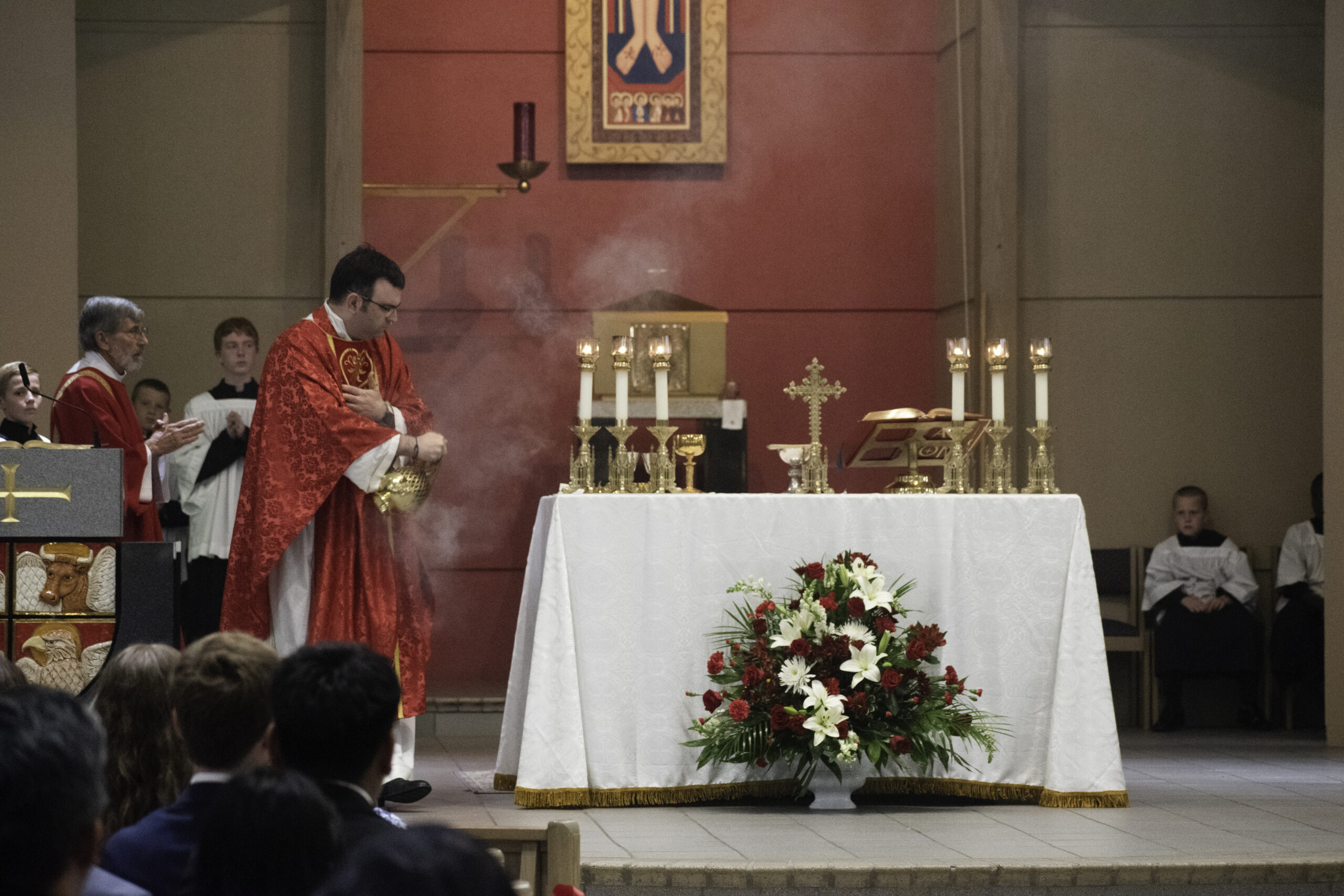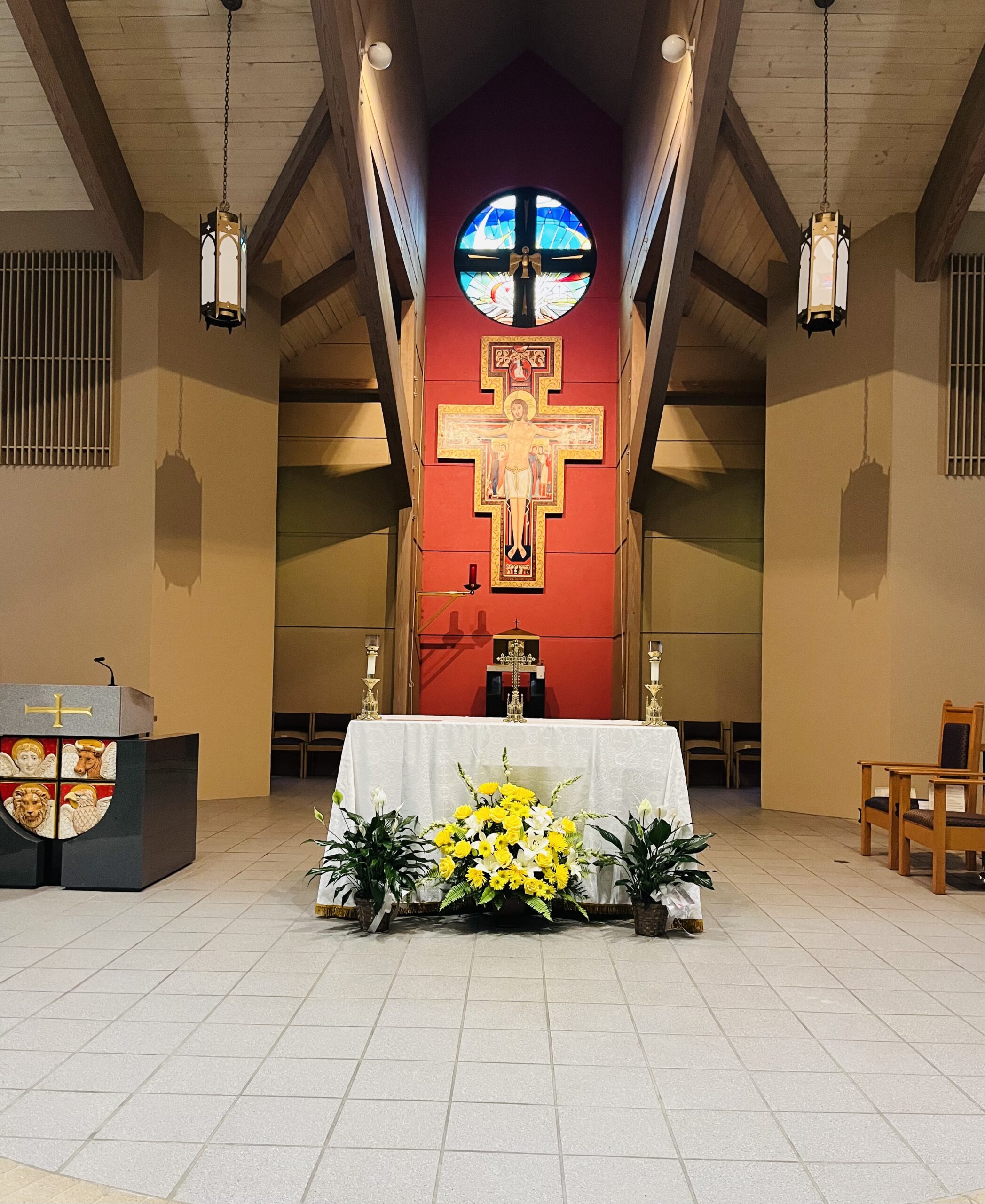MASS AND CONFESSION TIMES
Come encounter Jesus — not as history, but as a living Person who radically loves you, mercifully heals you, and longs to be one with you.
Liturgy of the hours & morning prayer
Monday's at 8:30am
MASS TIMES
Weekend
Saturday (Vigil Mass) – 5:00 pm
Sunday – 7:00am, 9:00 am, and 11:15 am
Weekday:
Monday – No Daily Mass
Tuesday – 12:00 pm
Wednesday – 8:30 am
Thursday – 8:30 am
Friday – 8:30 am
First Saturday of the Month – 8:30 am
CONFESSION TIMES
Tuesday – 11-11:45 am
Saturday – 3:30-4:30 pm or by appointment
Been a while since you've been to mass?
Welcome back! We’re thrilled you’re planning to join us for Mass at St. Peter’s. And so is Jesus — He’s been waiting for you!
If you don’t quite remember what’s going on — don’t worry! You can follow along with the Mass parts in the missal beginning on page 140, see our refresher below, or watch one of our past livestreamed Masses to get a feel for it.
But also, just show up — we’re happy to guide you where you need help!
If it has been a while since you’ve been to Mass, we encourage you to go to Confession first (see times above) so you can receive Communion.






WHAT'S ACTUALLY HAPPENING AT MASS?
Behind all that sit down, stand up, kneel, repeat is a Person — Jesus Christ. The Mass is the way in which we worship God, but in His goodness, He gives us something in return — His very self in the Eucharist.
To try to sum up the Mass in a sentence, it is the representation of Jesus’ sacrifice on the cross so that we can participate in it and be united to Him physically through the Eucharist, the real Body and Blood of Christ.
Here’s a quick summary of what happens ⬇

Gather and Pray

God's Word

The Eucharist

Live It
But the best way to find out is by just joining us and encountering Jesus for yourself.
Make plans to join us this Sunday — you are welcome here! (Yes, even if you have no idea what you’re doing, feel broken, or have a messy past…you’ll be in a good company!)
MASS AND CONFESSION FAQs
We have several ushers and greeters at each Mass who are happy to assist you however you need!
We can’t wait to welcome you to our beautiful church! You can visit this page for directions, parking, and a quick walkthrough of our main building so you feel comfortable. And of course, you are welcome to ask any of our ushers or greeters for assistance once you’re here!
Absolutely! Anyone of any faith or no faith at all is welcome to attend Mass. We are excited to pray with you and hope you grow closer to Jesus through this encounter.
Reception of Communion (when everyone gets up and stands in line towards the front to receive the host) is reserved to practicing Catholics, as the Eucharist is the Body and Blood of Christ and all those who receive state that they believe that upon receiving. But you are still welcome to come forward for a blessing at that time instead — simply cross your arms in front of you like an X and the priest or deacon will give you a blessing.
Yes, we do! And yes, we know that sounds odd at first. Since thousands of books have been written about the Eucharist, we can’t do it justice fully here, but yes, the Catholic Church teaches that during the Mass, the substance of the bread and wine (interiorly, not exteriorly that we can see) become the Body and Blood of Jesus. If you’re interested in exploring this teaching further, we highly recommend reading John 6 and Luke 22…or just coming and experiencing Jesus in the Eucharist yourself. (The Adoration Chapel can be a fantastic way to start!)
Since the Eucharist is the Body and Blood of Jesus, we need to prepare to receive Him into our hearts well. And since we say that we believe that the Eucharist is Jesus when we receive, we need to know what we are saying we believe and mean it!
As such, practicing Catholics who have received First Holy Communion, are not in a state of mortal sin, and have fasted from food and drink (water and medicine are acceptable) for one hour prior to receiving are able to receive Communion. Non-Catholics, non-practicing Catholics, and those aware of mortal sin are welcome to come forward to receive a blessing instead by crossing their arms in an X across their chest. (And if you have committed a mortal sin, please go to confession as soon as possible! See above for the times.)
In confession, a person states his or her sins and receives forgiveness for them from Jesus through the priest. We also receive the grace to resist temptation to sin in the future, so it’s doubly grace-filled to go to confession!
That’s why it’s recommended that Catholics go to confession at least once a month, with a requirement to go at least once a year.
It can be helpful to prepare for confession by doing an examination of conscience to review where we may have failed to love God and others as best we could.
We get it; telling someone else your sins can be uncomfortable. The first thing to know is that the priest is not judging you, and he also is bound to confidentiality and cannot tell anyone else what you confess.
But why do we do this? As with the Mass, the priest is acting on Christ’s behalf — and in the Gospels, we hear Jesus institute this exact structure for forgiveness of sins in John 20. It’s not the priest who is forgiving us; it is Christ Himself, working through the priest. In other words, we do this because Jesus told us to!
This is a great article if you want to learn more about why Catholics go to confession.
A sin is something that hurts or breaks our relationship with God. The Catholic Church defines two types of sins: mortal and venial sins.
Mortal sins are grave sins that break our relationship with God. In order for a sin to be mortal, it must be of “grave” matter, we must know that it is wrong, and do it anyway. There are nuances to what “grave matter” is, but an obvious example is a murder done intentionally knowing it is wrong. It’s essentially saying that we do not want to be in relationship with God anymore. The Catholic Church teaches that those who die with mortal sin on their soul will not be in heaven; therefore, it’s really important to confess mortal sins as soon as we can, because mortal sins can be forgiven and restore our relationship with God!
Venial sins hurt our relationship with God, but do not completely break it. These are things we do that hurt God, but are of less grave nature or we do not know that they are sinful. An example might a small lie or arguing with a relative, but the circumstances depend on the intention and severity of the sin. Venial sins do not need to be confessed, but it is highly recommended — after all, the grace of confession is not only the forgiveness of sins, but help to resist the sin in the future! Venial sins can also be forgiven by receiving Holy Communion and saying a sincere Act of Contrition.

